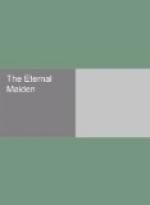“Ioh—io-h-h!” he sobbed, and tears coursed from his eyes.
The constant haunting thought of Annadoah’s face pressed close to that of Olafaksoah somehow made his face burn and his bosom ache.
“Ootah, Ootah, thou wouldst that Annadoah’s heart might wither, yea, as a frozen bird in the blast of winter, foolish Ootah, who lovest Annadoah! Soft beats the heart of Annadoah upon the bosom of Olafaksoah; yea, for very joy it flutters as a mating bird in summer time. Thou wouldst that beasts might rend her little breasts—safe are they now in the embrace of the strong man from the south. Ootah! Ootah!”
Ootah wrung his hands.
“Thy curses fall dead upon the ears of Annadoah, she who hears only the voice of Olafaksoah.”
In the winds Ootah heard the whisper of Olafaksoah in the dim tent. He heard Annadoah’s rapturously murmurous replies.
“Olafaksoah shareth the igloo of Annadoah,” whispered the winds suggestively. And Ootah knew the Eskimo custom.
Annadoah, by sharing her simple habitation with him, had by choice formally become the wife of Olafaksoah. And according to the unwritten law of ages she was now as much his property as his dogs. He might abuse her, and desert—and thus divorce—her whenever he chose. She might, at his pleasure, be loaned as a wife to another, and in this she would have no word. Or she might be given away, and dare not protest. Ootah felt that she was lost to him irretrievably.
For hours Ootah stood at the mouth of his mountain eyrie in dumb agony. All that he suffered it is beyond me to tell you. For days he crouched there, motionless, stark dumb, every fibre of him aching.
In the valleys below, as the hours of the burning days and golden nights passed, the sunlight constantly shifted. In the palpitating mists Ootah read of the days’ doings at the camp. He saw the white men bartering for the meagre remaining furs and ivories gathered by the tribe. With the natives he saw them going on long fruitless hunts. Finally one day he witnessed them harpoon a half dozen walrus on the sea. They laboriously towed the catch ashore and rejoiced over the unexpected wealth of oil and blubber. But the white men claimed the entire prize, loaded their extra sledges, liberally fed their dogs, and doled out but a penurious allotment of meat and blubber to the tribe.
But in all this Ootah had no concern. Day by day the cloud-swimming valleys below blazed with crimson-shot conflagrations . . . Ootah knew the dead were lighting their monstrous camp fires—but even in this he found no interest. Daily he became fainter and fainter from lack of food, and daily, constantly, the winds whispered:
“The mouth of Annadoah is very red—red as a wound in the throat of a deer . . .” and then sibilantly—“softly beats the heart of Annadoah against the bosom of Olafaksoah.” Then every fibre of him burned and ached.




